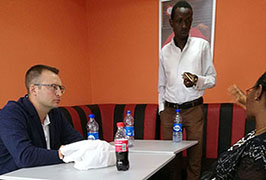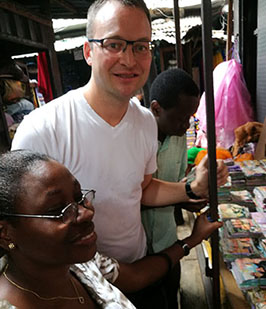In the MIGMA research project, postdoctoral fellow Erlend Paasche at the UiO and research professor Jørgen Carling at the Peace Research Institute Oslo (PRIO) jointly analyse representations of migration in Nigerian film and fiction.
Experiencing Nollywood

Paasche recently spent some days in Lagos, Nigeria, compiling relevant Nigerian books and films in which migration was a significant theme. While Nigerian fictional literature does not have a huge domestic readership, a thriving film indusry has emerged since the early 2000s. The Nigerian ‘Nollywood’ film industry is stated to be the second largest film industry in the world. A lot of the movies produced in Nigeria are also easily available on the internet. A local consultant with knowledge of the Nollywood industry has been helpful in singling out specific films and fictional works for analysis.
Professor May-Len Skilbrei, head of the MIGMA project, is very happy that this sub-project is part of MIGMA. She is looking forward to learn more about migrants’ perspectives and Nigeria from the results of the project. While migration research often relies on interviews and document analysis of policy documents, Skilbrei believes the research field would benefit from more researchers including other materials and drawing on the tradition of cultural analysis and humanistic disciplines.
Migration through popular culture
The perspective of the communities sending out migrants is often missing in migration research. In the first newsletter for the MIGMA project, Paasche writes:
Browsing through dusty DVD covers at a bustling street market, I was once again reminded of the necessity of studying migration from the perspective of a sending region. What policy makers in Europe see as immigrants were described in these books and depicted on these DVD covers as emigrants.

Popular culture can hopefully unveil some of the norms and expectations that guide the behavior of Nigerian migrants. ‘What do dear ones left behind expect from migrants? In what way do migrants feel morally obligated to them? And what counts as successful return? Such questions will guide resarch for months and years to come for Paasche and Carling.

